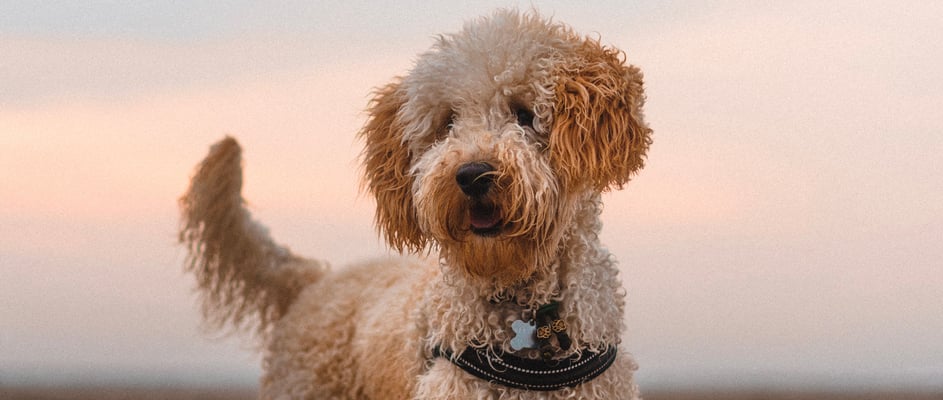The guide to owning a Goldendoodle.
Want to know everything there is to know about finding the right dog for you? Submit your email below, and we’ll send you a one-stop guide to help you on your pet-ownership journey.
Jump to:
Stats at a glance.
History of the Goldendoodle.
Meet the Goldendoodle, a delightful crossbreed born from a Golden Retriever and Poodle pairing. Their story began in the 1990s when breeders hoped to create dogs with the intelligence of Poodles and the friendly nature of Golden Retrievers.
The success of the Labradoodle paved the way, and soon these charming, low-shedding companions arrived on the scene to steal hearts everywhere.
We adore how Golden Retriever and Poodle genes combine in this crossbreed. From the earliest standard Goldendoodle to modern variations like the f1 Goldendoodle, the f1b Goldendoodle, and multigen Goldendoodles, each mix brings a slightly different coat texture and size.
These dogs have soared in popularity and are often seen as therapy dogs, assistance dogs, or simply considered one of the best dogs for families craving a friendly, playful companion.
If you’re curious about other larger breeds, you might enjoy our guide to big dog breeds.


How much is a Goldendoodle puppy (UK)?
Wondering about the cost of Goldendoodle puppies? In the UK, prices vary depending on factors like pedigree, breeder reputation, coat type, and location. You might expect to pay anywhere from £500 to £3,000 for a puppy.
A reputable Goldendoodle breeder will let you meet the parent dogs, often a Golden Retriever and a standard or miniature Poodle, and will share health certificates. They’ll also ask plenty of questions to ensure their puppy is going to the right home.
Colours and coat types.
Goldendoodles come in an eye-catching range of colours. Some are classic gold, while others are cream, red, chocolate, or even parti-coloured. Because these Doodle dogs are a mix of Poodles and Golden Retrievers, their coats can vary from straight to wavy or curly.
Coat types
Wavy/curly coat: Medium to high chance of being low-shedding. Common in standard or miniature Poodle crosses. Requires regular grooming.
Straight coat: More like a Golden Retriever coat. Might shed more than curlier types. Still needs brushing but may lose less hair volume than a thicker retriever coat.
Fleece coat: Soft, loose curls. Popular for folks hoping for minimal shed. A hallmark in various f1b Goldendoodle lines.
If you want more tips on grooming for all coat types, our tips on how to bathe a dog can keep an active dog smelling fresh.
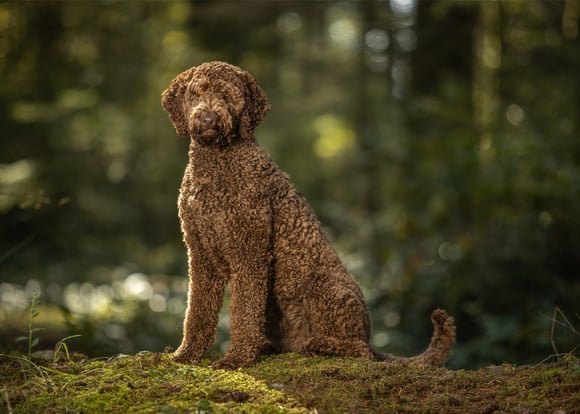
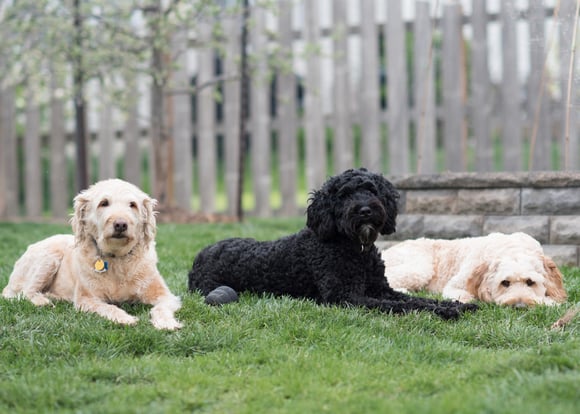
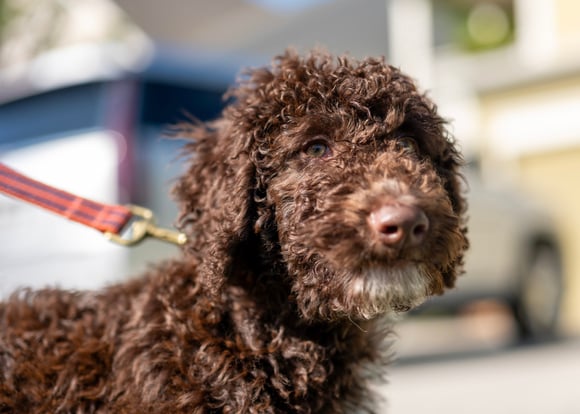
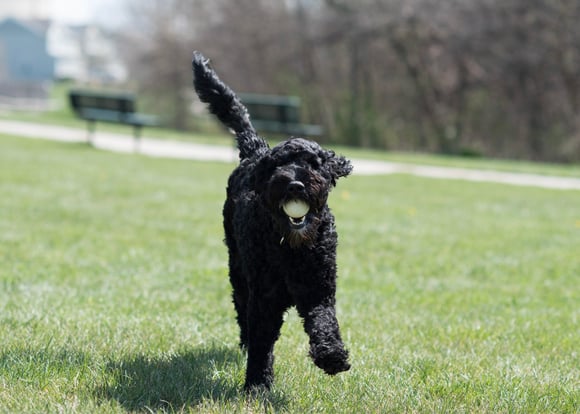
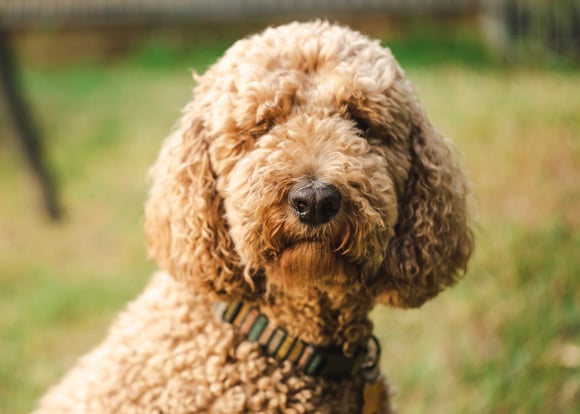
Size and weight.
Depending on their mix of parent breeds, Goldendoodles come in different sizes.
Standard Goldendoodle: Stands around 51-61cm at the shoulder and can weigh 20-34kg.
Miniature Goldendoodle: Typically 30-45cm tall, weighing about 9-14kg.
Despite their size differences, these energetic dogs generally share a similar sunny disposition. If you’re after something smaller, check out our top 10 small breeds for other petite canine options.
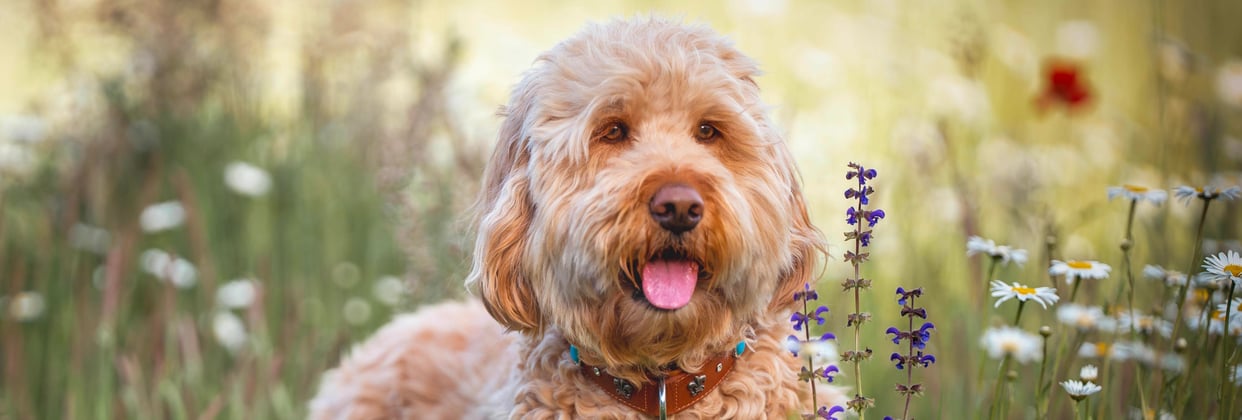

Temperament and behaviour.
Goldendoodle personality is famously gentle, social, and eager to please. They love people, often greet strangers like old friends, and thrive in homes with other dogs or pets. Their mix of Golden Retriever and Poodle charm makes them wonderful companion dogs for adults and children alike.
Do Goldendoodles make good pets?
Absolutely. Goldendoodles are loyal, affectionate, and versatile. They fit into many lifestyles, from busy families to retirees.
Are Goldendoodles good with kids?
Yes. Goldendoodles adore children and usually match their energy for play. Smaller kids might need gentle supervision to ensure they don’t accidentally get knocked over by an excited, larger Doodle with a wagging tail.
Are Goldendoodles good with cats?
Many Goldendoodles learn to live happily alongside cats, provided they’re introduced at a relaxed pace. They’re typically people-oriented, so with patience, most will accept a feline friend.
Do Goldendoodles suffer from separation anxiety?
They can, especially since Goldendoodles bond closely with their families. If your schedule involves regular absences, consider dog daycare or a walker to break up the day. For further help, our separation anxiety guide may calm worries.
Can Goldendoodles be left alone?
Most Goldendoodles can handle a few hours solo, but they’re not fond of day-long isolation. They’re active dogs who crave both human connection and mental stimulation.
Can Goldendoodles live in apartments?
Smaller varieties like mini goldendoodle can adapt well to apartments, provided they get daily walks and plenty of exercise. Larger Goldendoodles can also manage but may need extra outings to stretch those legs.
Do Goldendoodles bark a lot?
They’re typically moderate barkers. However, a bored dog might voice opinions more often. Positive reinforcement and consistent dog training help your Goldendoodle find calmer ways to communicate.
Training a Goldendoodle.
Are Goldendoodles smart?
Yes. With Poodles in their lineage, Goldendoodles are quite intelligent. Coupled with a Golden Retriever’s trainable nature, they pick up commands quickly.
Training Goldendoodles involves setting clear boundaries, using positive reinforcement training, and keeping sessions fun.
Short, engaging lessons backed by treats or praise are typically the key. Think puzzle toys, scent work, or mild dog sports to channel their bright minds.


Shedding and grooming.
How often should I brush my Goldendoodle?
Regular brushing is vital, especially for curlier coats. Aim for several brushes a week for a tangle-free (and less mat-prone) coat. Goldendoodles do need a lot of grooming compared to some breeds, and a professional groom every 6-8 weeks can help maintain coat health.


Exercise and mental stimulation.
Goldendoodles might be bigger dogs or smaller ones, depending on the type, but they all share an energetic streak. They usually need 60-90 minutes of exercise per day.
Walks, fetch, swimming, and interactive play keep them happy. Many also love advanced mental stimulation like puzzle toys or agility.
Because they come from working lines, it’s wise to vary their activities. A mix of Golden Retriever traits with standard Poodle intelligence means they excel at problem-solving. Incorporate play sessions and sniffing games.
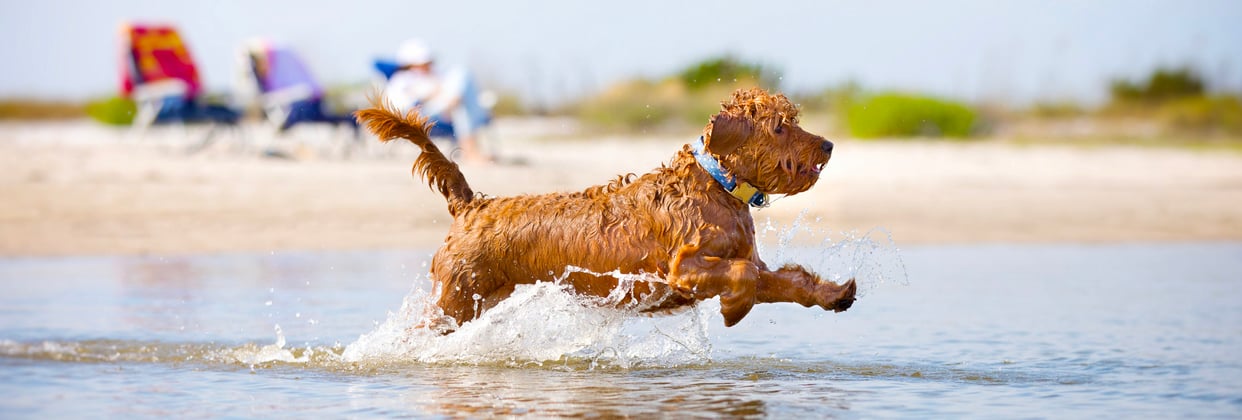

Feeding and nutrition.
Choose a high-quality dog food that suits their life stage whether it is puppy, adult, or senior. Goldendoodle pups may need smaller, more frequent meals, while an adult dog does well with two daily portions.
Obesity in dogs can be the cause of many health issues so watch out as these cheerful canines love food and might beg for extra snacks.
Monitor body condition with weigh-ins and portion adjustments. Our tip: track your dog’s coat quality, energy levels, and how often they produce healthy stools. (For extra guidance on picking up signals from poop, see our understanding dog poop colour article.)
Common health issues in Goldendoodles.
Although Goldendoodles are generally healthy dogs, they can face certain health conditions linked to both Poodles and Golden Retrievers. Early detection and regular grooming check-ups help spot possible concerns.
Note: Costs are approximate and can vary based on location and specific veterinary practices.


Pet insurance for Goldendoodles.
Because Goldendoodles can inherit joint issues and other conditions, having a solid safety net is key. Comprehensive cover gives peace of mind for sudden vet bills or long-term issues. (be sure to check for pre-existing condition exclusions)
We recommend Goldendoodle Pet Insurance to ensure their well-being:
Lifetime coverage for chronic conditions
Support for Goldendoodle health concerns like hip dysplasia
24/7 online vet access
Free behaviour and nutrition consultations
Goldendoodles bring laughter, warmth, and a playful spark to any family. Their mix of loyalty from the Golden Retriever side and brainpower from the Poodle side makes them an all-around favourite among dog owners.
With positive reinforcement training, regular brushing, and a watchful eye on health conditions, your Goldendoodle can enjoy a long life by your side.

